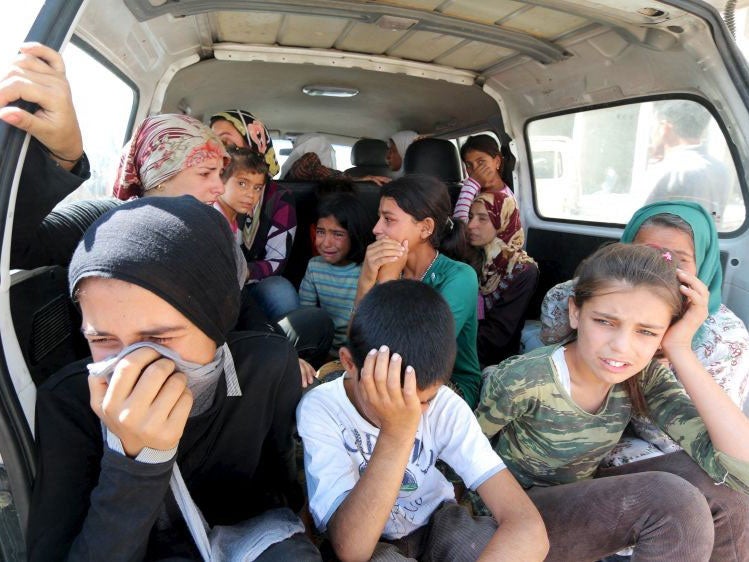A year on from the death of Alan Kurdi, we’ve still not done enough to solve the refugee crisis
When five London day-trippers drowned at Camber Sands last week one of the first questions asked by some onlookers – and media – was whether they might be illegal immigrants, which surely goes to show how far our irrational fears of a migratory invasion have come


A year ago this week a little boy was washed up dead on a Turkish beach and became a symbol of the refugee crisis caused predominantly by conflict in Syria and Iraq. Pictures of Alan Kurdi appeared to show not only how bleak was the predicament facing many in war-torn regions, but also how Europe – with its comparative peace and prosperity – had failed to work out a cogent or unified response.
As it happened, Alan Kurdi’s death coincided very nearly with the anniversary of the outbreak of the Second World War. The Independent’s editorial of 2 September, which called on the British government to take a fair share of refugees, noted that the time had come for European countries to work together and to demonstrate how far the continent had come since the dark days of World War II.
Twelve months later, it is arguable whether the various conflicts in Syria and beyond its borders are any closer to their conclusion. Isis may have lost ground in Iraq to resurgent government forces, while the group has also been squeezed in parts of Syria. Yet elsewhere, Syrian rebels – said to have been re-equipped by Saudi and Qatari backers – have surprised Assad’s commanders by renewed action, leading to vicious fighting once again in what is left of Aleppo. And Turkey’s decision to send ground troops into northern Syria, notionally to combat Isis, but also with a view to pushing back Kurdish advances, further complicates the situation. With Russia and the US both heavily invested in this multi-faceted scenario too, the Syrian conflict has become the most significant proxy war since Vietnam. It is civilians who suffer.

As for Europe, unity of purpose seems in short supply. Individual countries have taken diverse approaches: Germany remains open for new asylum applications; other borders were slammed tight and remain firmly closed, especially in the Balkans. The European Union’s deal with Turkey in March for Ankara’s authorities to take in new “irregular migrants” arriving in Greece, in return for financial assistance and various other pacifiers, reduced unchecked migration to a degree. Still, the UNHCR still estimates that a quarter of a million people will enter Europe from the east in 2016. And with Turkey’s government becoming ever more autocratic following the failed coup against President Erdogan, the EU may come to wonder whether its “solution” to the refugee crisis was more a deal with the devil.
Here in Britain, we find ourselves on the way out of the EU, June’s referendum having turned less on whether the Union was an excessively bureaucratic mess, and more on emotional fears about borders, a perceived dilution of “British” culture and a seeming belief that compassion can be an island. Nigel Farage’s "Breaking Point" poster might have been widely criticised, but it struck a chord with many. If any other country in Europe had voted to leave the EU, we would interpret it as a victory for nationalism – we should not come to a contrary conclusion just because it happened here. When five London day-trippers drowned at Camber Sands last week one of the first questions asked by some onlookers – and media – was whether they might be illegal immigrants; which surely goes to show how far our irrational fears of a migratory invasion have come.
A return to one of mankind’s more basic political and social instincts is no doubt a consequence of world events – the financial crash, the rise of Islamist extremism, the refugee crisis – and is perhaps more a railing more broadly against the process of globalisation. But it has been facilitated too by a wider coarsening of public debate in which almost anybody in a position of responsibility is seen as fair game for the most virulent of criticism. Those who argue for compassion are treated with contempt or to facile claims about what sacrifices they personally are prepared to make. Experts are derided for any sort of analysis or prediction that goes beyond stating a provable fact – increasingly, even facts are pooh-poohed. Humility has fallen out of fashion in favour of a passion for humiliating others. The traditional media and social media have both played their parts.
None of it matters to those who mourn dead Syrian children. And for those stuck in Aleppo, or in refugee camps in Lebanon, or at the Jungle in Calais, hand-wringing over the seeming decline of kindness in the West achieves little. When The Independent launched its petition a year ago urging the government to take in more refugees, nearly 400,000 people added their signatures within a few days. In response, the government agreed to increase the number to whom it would offer asylum – to 20,000 over five years. At the time that figure seemed significant. With hindsight, it feels like a drop in the ocean. Not unlike Alan Kurdi.
Join our commenting forum
Join thought-provoking conversations, follow other Independent readers and see their replies
Comments
Bookmark popover
Removed from bookmarks